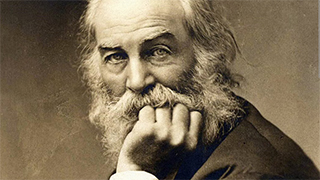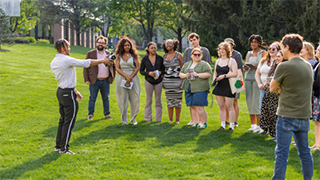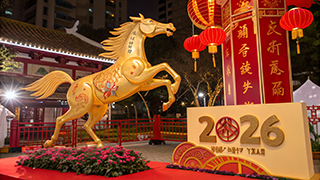Center for Catholic Studies Hosts Science and Religion Institute - Seton Hall University
Monday, November 14, 2022
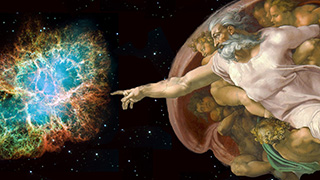
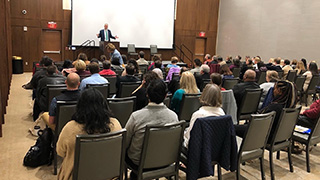
Chris Baglow, Ph.D., (Notre Dame) presented two keynotes to over 80 Catholic educators.
The opening and closing keynotes were delivered by Chris Baglow, Ph.D., (Notre Dame) who presented on two overarching themes, Faith and Science: How and Why and Catholic Academic Integration: Science, Literature, and History. His opening presentation described how "Science and Religion draw each other into a wider world where both can flourish." His closing keynote integrated many discussions by speaking to the way in which Catholic education can offer students the ability to see God's truth, beauty, and goodness through interdisciplinary pedagogy.
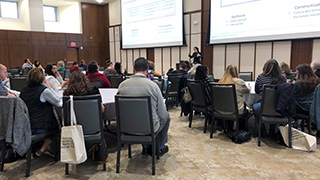
Heather Foucault-Camm presented on Good Science and Science for the Human Good.
The program was designed to support K-12 educators in Catholic Schools, with a particular emphasis on science and religion faculty. The day’s breakout sessions were arranged according to level. Middle School and High School teachers were offered the opportunity to attend two break-out sessions. Session 1, The Galileo Affair, was presented by Cory Hayes, Ph.D., professor of philosophy and theology at St. Joseph Seminary College in Covington, LA. Session 2, Good Science & Science for the Human Good: One and the Same?, was presented by biologist Daniel Kuebler, Ph.D., (Franciscan University, Steubenville), and Heather Foucault-Camm, a chemistry teacher and now program Director for the Science and Religion Initiative.
Elementary school teachers were offered a separate breakout track with two sessions tailored toward engaging younger students in the area of Science and Faith. The first K-8 session, Faith and Reason in K-8 Classroom Practice: Making STEM a Force for Good, was team-taught by Matthew Kloser, Ph.D., and Mr. Michael Szopiak from the Center for STEM Education (Notre Dame). The second session, Catholic Anthropology, was presented by Jo Ann Mathieson, a lifelong educator with experience as a teacher, professor, principal, and Diocesan assistant superintendent of schools.
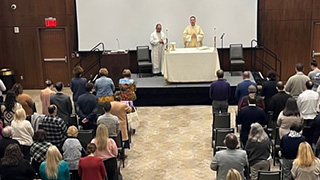
Attendees gather to celebrate Mass with Fr. Joseph Laracy.
Attendees gathered for midday Mass with Fr. Joseph Laracy, S.T.D., assistant professor at Immaculate Conception Seminary School of Theology and president of Seton Hall’s chapter of the Society of Catholic Scientists. In his homily, Fr. Laracy addressed the need for the important dialogue between Science and Faith, especially with young people in our Catholic Schools. Fr. Laracy expressed "The professional development day for science and religion teachers in Catholic schools offered by SHU’s Center for Catholic Studies, in collaboration with the Science and Religion Initiative at the McGrath Institute for Church Life at the University of Notre Dame, was a beautiful example of what Pope Francis has called for in terms of harmonizing the insights of natural science, metaphysics, and faith, which can ultimately make us open to wisdom."
Each presentation throughout the day was followed by extended opportunities for discussion. One participant remarked how this event was extremely beneficial since, in her experience, students have a deep desire to find the "deeper meaning" of life and how the world works. Many want to understand both faith and science and are open to discussing their complementarity rather than viewing them as mutually exclusive. Peach Smith, of Koinonia Academy in Plainfield, NJ stated, "As a long-time high school science teacher and developer of science curricula who has spent decades trying to overcome the objection to integrating faith into science classes and vice versa, the Seton Hall Science and Religion day was an absolute delight to attend." She also remarked that,
This kind of day is much needed for teachers who are tasked with helping to form our future scientists, thinkers, and students, to give them the tools necessary to spread the Gospel in a world that is in great need of a better understanding of both science and faith. I look forward to the next such event at Seton Hall, and thank the organizers for their work making this happen.
Smith and several others have already inquired about next year’s program.
A key aspect of the Center’s Porticus Grant proposal was to facilitate programs that minister to the local Church and community.Gregory Floyd, Ph.D., Director of the Center for Catholic Studies noted,
Our inaugural Science and Religion Institute day was exciting to plan and fulfilling to execute. We welcomed nearly one hundred local educators to Seton Hall creating new relationships and the rediscovery of old ones. At the Center, our hope was to make the intellectual resources of the university available to the local community and to learn from our neighbors in education about their students, schools, and classrooms. The day was a success on all accounts. We are grateful to the support from the Porticus foundation which made this event possible and affordable for the attendees as well as to Notre Dame’s Science and Religion Institute.
Furthermore, annualizing this program would enable an ongoing effort that could reach hundreds of Catholic educators each year throughout the state of New Jersey. Matthew Higgins, Director of Programs at the Center for Catholic Studies expanded on this plan,
The goal is to offer this program every year and grow to include all five Dioceses in New Jersey so that Catholic educators from Newark, Paterson, Metuchen, Camden, and Trenton are afforded the great opportunity to dialogue about ways in which we can teach our young people the intersection of Faith and Reason, of Science and Faith. Due to the generosity of the Porticus Foundation, that goal can become a reality. We feel it would be a great opportunity for us to minister to those who dedicate their lives to the ministry of education in our local Church.
As the program develops, the next stage is to engage Seton Hall faculty interested in this conversation as presenters, facilitators, resources, and partners in the work of science education and Catholic education. Such development would make the riches of our intellectual and academic life on campus useful to the wider church and community beyond it.
With plans already in the works for next year, the Center for Catholic Studies is looking forward to offering another successful program.
Categories: Education, Faith and Service




